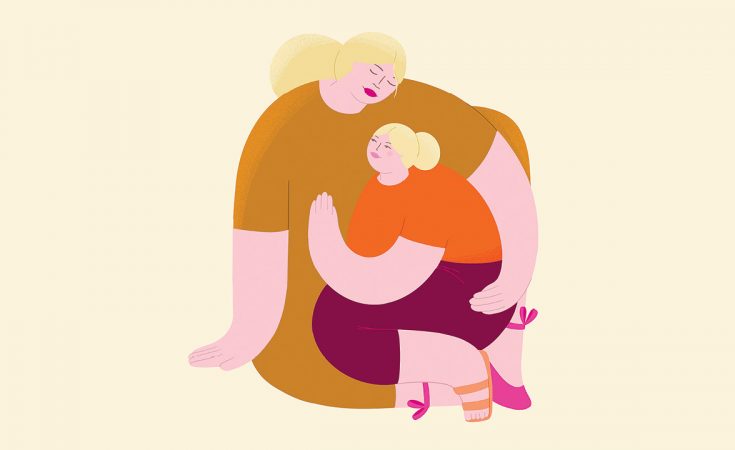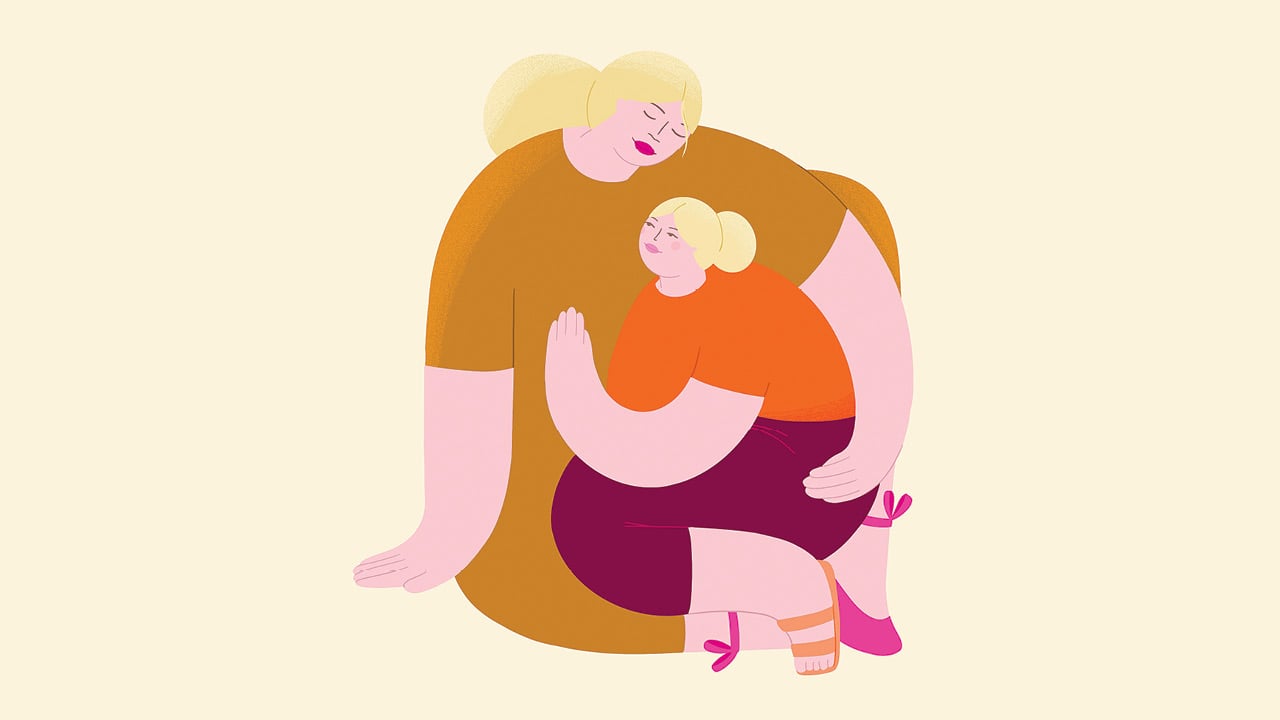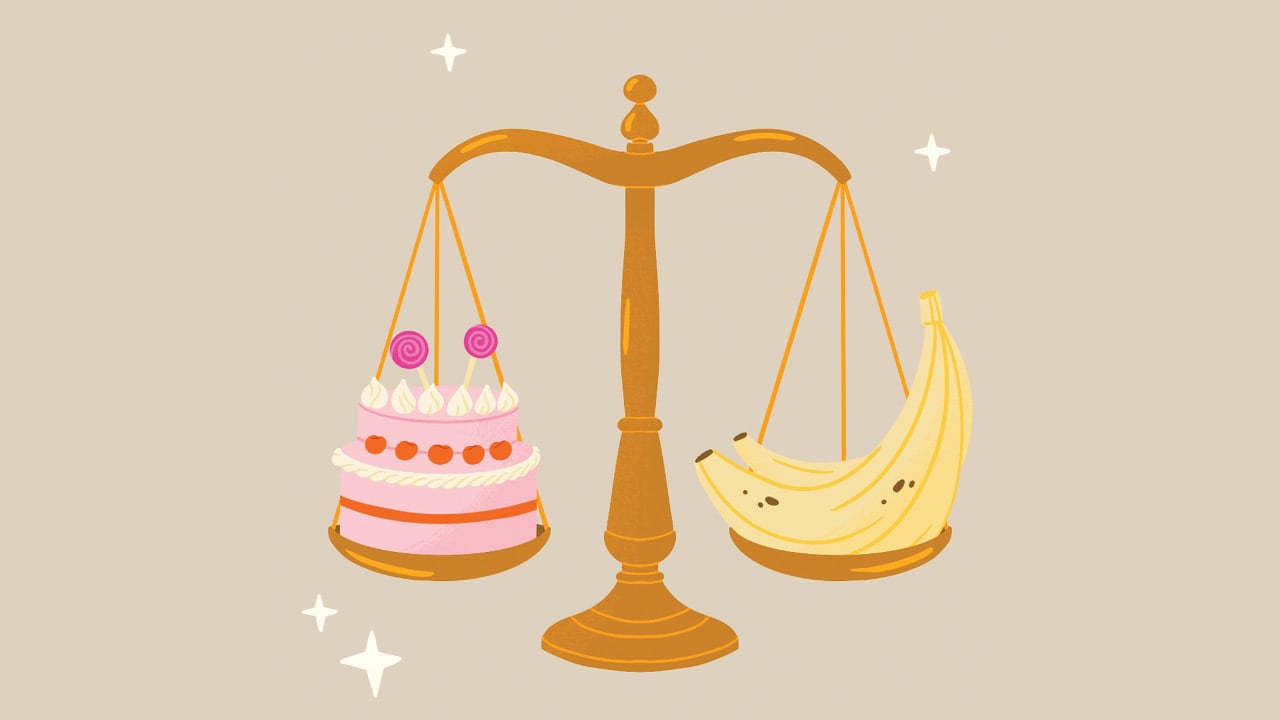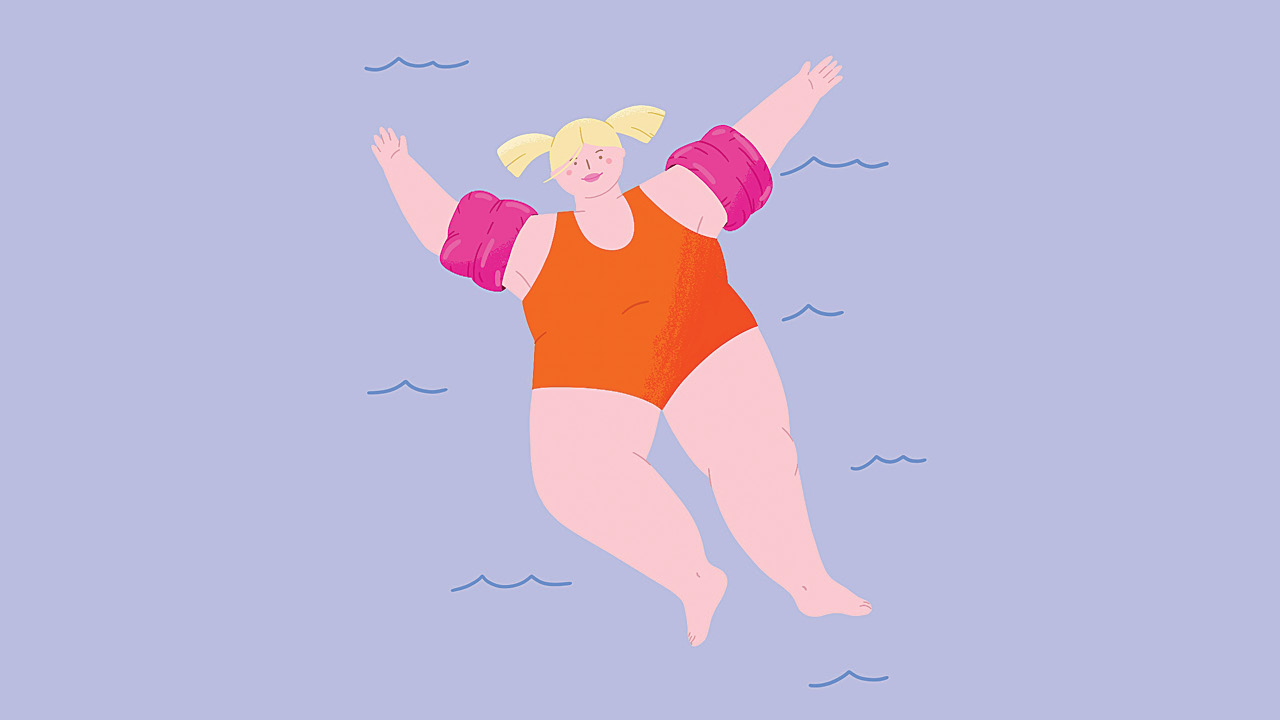My mom and I never really talk about how she mothered her fat child. It’s too painful for both of us. But after she read a blog post of mine, she called me.
“I’m so sad,” she said. “I experienced the same issues with being an overweight child, and I didn’t want my daughter to go through the same experiences. But the steps I took just made it worse.”
I get it: It’s impossible to have a child and not feel a primal need to protect them from painful things you experienced in your childhood. But in trying to pre-emptively protect me, she ended up being the first person to teach me to distrust and feel ashamed of my body.
I don’t blame her or hold a grudge. Parents do the best they can with the tools they have. When my mother was parenting me, there was no guidebook for how to raise a fat child. The only thing she knew how to do was teach me to protect myself by thinking about what people might tease me for, to sign me up for sports, to listen to the paediatricians telling her I should lose weight, and to encourage me to eat less and move more. In my case, it was trying to fight city hall. I come from a family of large, stocky people. I was going to be fat no matter what she did.
So, since no guidebook was available for her, this is my attempt to help parents who are where she was. How do you raise a fat, healthy, happy child? I’m not a doctor or a psychologist. I’m just a fat kid who grew into a fat adult, and this is what would have been helpful to me.
1. Teach them about body diversity.
One of the most painful things I experienced as a fat kid was the sheer helplessness I felt being in my body. Thin was the default. All the kids around me were thin. My siblings were thin. My mom was thin. I was not. And it really and truly was not my fault; fatness is hard-coded into my DNA. And yet I felt like my body was failing me.
But what would have happened if I had been told that my body was good as it was? What if I had learned about body diversity as a child instead of in my late 20s? As a society, we have become much better at teaching children about the differences in humans, but we rarely include weight diversity in these lessons.
Raise your children to understand that thin is not the default, but just one point on a vast spectrum of different body sizes. Some bodies are thin. Some bodies are fat. Some bodies are muscular and burly. Some bodies are fat in some places while being thin in others. And they are all good.
When your child asks, “Why is that person fat?” or “Why are you fat?” or even “Why am I fat?” don’t tell them it’s mean to ask that question. Tell them that it’s just one way for a body to be. Explain to them that no two bodies are alike, and some bodies are bigger than others, just like some bodies are smaller than others. Teach them that no body has more value than another. Tell them all bodies are good bodies. Ask them, “Isn’t it amazing that there are so many different ways to be?”
2. Teach them to trust their bodies and their hunger.
Or, rather, don’t teach them to distrust their bodies. Children are born with inherent body trust. They know, without trying, what their bodies want. Babies know when they are hungry, when they are ready to roll over and hold their own heads up, and to stand and walk for the first time. Distrust is taught.
It happens slowly. Sometimes, distrust is sown by unavoidable things, like when a child feels confident they can jump from a great height and instead ends up falling and hurting themselves. That kind of distrust, the kind that teaches caution, is useful. But sometimes distrust is sown by parents questioning things that a child inherently knows—for instance, when a parent questions whether their child is really hungry, or really needs a second helping or snack. That kind of distrust can be poison. And fat children learn that distrust much more often and more harshly than thin children.
In fat children, this is the beginning of disconnecting mind from body. It’s how children develop fraught relationships with food and eating and internalize shame around food.
I’m in my 30s and I am still working on re-establishing the connection between my mind and body. By the time I was a teenager, I no longer felt the normal cues of hunger and fullness. I had my hunger interrogated as a child and learned to interrogate it myself. And soon I had no sense if I was hungry or full. I turned to diets to teach me how to eat, because I no longer had a clue and didn’t trust my own hunger and body. This pulled me further and further away from these natural cues.
Allow your children, even when that child lives in a fat body, to trust themselves.
3. Let them walk away from activities they don’t enjoy, without guilt or shame.
It’s great to encourage kids’ interests in organized movement. But where it gets tricky, and where it can have a lifelong impact, is when they are not allowed to quit activities they don’t enjoy.
I get it. Organized sports? Expensive as hell. Dance class? By the time you pay tuition and buy the leotards, tights and ballet slippers, it’s not just a class, it’s an investment. It can also seem like a great time to teach kids a lesson about sticking with a commitment.
But childhood is a time of exploration. And when it comes to trying out new activities, kids are not going to like everything they try. And when it comes to exercise and movement in particular, the ramifications of forcing them to stick with it can be long-lasting and severe. It can turn an innocent attempt to try something new into something that feels like punishment. And that, in turn, can make physical activity in general feel like a punishment.
So here’s what parents of fat kids can do: Let your kids try new things. If they enjoy it, awesome! But if they come to you and say they don’t want to go anymore, ask questions, ask them why—but let them walk away.
Illustration: Lucila Perini
4. Don’t restrict their diets, and don’t moralize food.
This is hard for parents of fat children: Year after year, when they take their children to the paediatrician, they are told their child is too heavy. And usually the advice is “eat less and move more.” (Can you hear me sighing through the text here? Because I’m loudly and dramatically sighing.)
The trouble is, restriction makes people hungry, and it can lead to weird and disordered behaviour around food. When you restrict specific foods, and frame foods as “good” and “bad,” it’s hard for kids to understand. It usually results in fear of food, and a feeling that their own natural desire for certain foods that are “bad” is, in fact, what’s “bad.” It creates guilt and shame.
When my mother attempted to restrict my diet, I started hiding food. I hoarded snacks in my room. I snuck into the kitchen at night and ate in secret. I became afraid of eating in front of people. I often ate two meals—the smaller “healthy” meal of “good” foods I ate in front of my mother, and the secret meal I ate later when I was still hungry and obsessing over the food I actually wanted to eat.
Fat kids should, in fact, be offered an abundance of food. Make all kinds of food available to them. Encourage a love of food. Have them cook with you and develop positive memories of food while teaching them valuable skills that will help them throughout their lives. Add foods—don’t take them away.
And be neutral about food. All food can be part of a healthy, well-lived life. Teach them that food is just food. Eating broccoli will not put a halo around anyone’s head, and eating ice cream or chocolate or greasy fast food is not “indulgent” or “bad” or “sinful” or “decadent.” It’s all just food. This doesn’t mean that if your kid wants ice cream for dinner every night, you should give them ice cream for dinner every night. This is not about adhering to your child’s food whims; it’s just striking a balance of providing thoughtful guidance about how to eat for nourishment and setting them up to have a positive relationship with food and their bodies.
We know that restrictive diets for kids don’t work. They usually do nothing but f*ck up their relationship with food, with themselves and with their parents.
5. Work on your own f*cked-up relationship with food and your body.
Your kids see you. They watch you. They notice the things you do. You’re their role model for how to be a person. So, if you’re struggling with your own shitty relationship with food and your body, they will absorb that. And, sooner or later, they will start to mirror it right back to you.
It’s not easy. But it’s essential for parents to model a positive relationship with food and their bodies. This means eating intuitively, no food moralizing at the dinner table, no talking shit about your own body or anyone else’s, no dieting, and no limiting your own experiences and enjoyment because of your body size (for example, not joining your kids in the pool or at the beach because you don’t want to be seen in a swimsuit).
This might require some soul-searching and maybe even some therapy. But it will be worth it, not just for your kid, but for you.
You can’t possibly hope to raise a happy, confident fat kid if you are personally torn up about your own weight. You just can’t. You can’t make your kid believe that they are worthy, good, loved and enough at any size if you can’t believe it about yourself. You can’t save your kid from a lifetime of dieting and misery while you’re doing keto or Weight Watchers or googling weight loss surgery to lose weight yourself. You can’t teach them to trust their bodies when you don’t trust your own. And you can’t instill in them the idea that all bodies are good bodies when you associate your body and your child’s fat body with pain, humiliation and torment.
6. Don’t try to protect your child from bullying by accidentally assuming the role of the bully.
For me, it started when I was a chubby kid who wanted to buy a bikini in my favourite colours. “What if kids make fun of your stomach?” asked my mom, frowning.
It had never occurred to me before. It was, honestly, the first time I had really considered my fat belly at all. And all it took was a quick disapproving glance and a question to create 30-odd years of intense insecurity about my belly.
I get that this is hard. When you have kids, you’re seeing them through the eyes of all the schoolyard taunts you endured. So, letting them leave the house in the outfit they love but might get them teased in feels like sending a lamb to slaughter. But when you try to stop them, you assume the role of the bully. You are bullying your child to prevent them from being bullied.
And here’s why that’s wrong:
• It lends validity to the theoretical bully’s taunts.
• It places the onus on your child to avoid bullying, rather than on other children not to be bullies.
• Your child might not get bullied or taunted at all, which means that you’ve crushed their confidence on an assumption.
• It can be the first time your child has ever considered that something about them is a thing they could be teased or bullied about, building new insecurities.
• It erodes their trust in you as their parent and protector.
• It chips away at their self-confidence.
• It teaches them to consider what others might think or say ahead of what they want and how they feel.
• It can make them feel hurt, ashamed, embarrassed and unsafe.
• And really I could just go on and on forever.
This requires abandoning some control. Your child might get teased. They might come home in tears. But you should be a safe harbour. You should be a place of acceptance, safety and love. And you can talk to them about bullying and how to deal with people who are mean to them, and you can reinforce that their body is their own, belongs to them, and it’s not OK for anyone to make fun of it. But you should never, ever imply that they were even remotely at fault or that they are deserving of ill-treatment.
Illustration: Lucila Perini
7. Be a fierce advocate for your child with doctors, teachers and other adults.
Fat kids are almost certain to have their weight singled out as a problem by adults. But you, as their parent, need to be your kid’s fiercest advocate.
If your doctor is telling you that your child’s weight is a problem, there are things you can do. Insist that these conversations happen without your child around to hear. Request that your child not be weighed. Request that they provide you with evidence-based medicine and provide scientifically sound information about their concerns and recommendations.
And, if necessary, move to a paediatrician who focuses less on your child’s weight.
Don’t allow them to beat you down into thinking that a higher-weight child is a medical crisis. Don’t allow them to convince you that you must make your child lose weight at any cost. Stand firm in your belief that all bodies are good bodies, and call them on fatphobia and bad information. Arm yourself with knowledge—Lindo Bacon’s book Health at Every Size: The Surprising Truth About Your Weight is a great place to start.
Other adults, even ones who are “professionals,” have no right to undermine your intention to raise your child to believe they are good, worthy, valuable and loved at any size. You do not have to listen to paediatricians or school nurses or administrators. Stand. Your. Ground.
8. Teach them about fatphobia, weight bias and why they’re wrong.
Your child is sure to encounter fatphobia at some point in their lives, directly or indirectly. And, like racism, sexism, homophobia, transphobia and other forms of discrimination and hate, it’s important to talk about it with your child and let them know that it’s wrong.
This can mean pausing a movie and talking about negative depictions of fat people. (I love Harry Potter, but whoa, Nelly, the Dursleys would be a great entry point to talking about how fat people are often portrayed as villains.) This can mean calling out a friend or family member making fatphobic comments about other people’s bodies. This can be sitting down and having tough talks about discrimination your child personally experiences. But it’s important to frame it as what it is: inexcusable, rooted in hatred and fear, and never OK.
9. Expose your child to positive representations of fat people.
Representation is important, so make sure your fat kid has access to media where they are represented. Have conversations with your kids about the representation of fat people in books and movies where fat means villainous, dishonest, lazy, bad, stupid or mean, as well as balancing these portrayals with positive ones.
10. Love and accept them for who they are.
This one should go without saying, but it can be hard for many parents to do in practice. Sometimes fat children can grow up feeling like nothing they do will make their parents prouder than losing weight. I still feel that way sometimes. So it’s important to commit to accepting, supporting and loving your child no matter what—even if they remain fat their whole lives.
When you raise your fat child in an atmosphere of love and acceptance, they may grow into fat adults. But they will grow into confident, capable fat adults, well-equipped to deal with a world that still has a million miles to go toward body liberation. And that, really, is the best any parent can do.
Follow Linda Gerhardt on Instagram @littlewingedpotatoes.





































